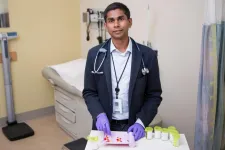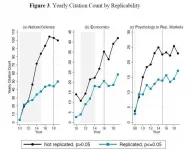INFORMATION:
Article Title: Which personality traits can mitigate the impact of the pandemic? Assessment of the relationship between personality traits and traumatic events in the COVID-19 pandemic as mediated by defense mechanisms
Funding: The author(s) received no specific funding for this work.
Competing Interests: The authors have declared that no competing interests exist.
Article URL: https://journals.plos.org/plosone/article?id=10.1371/journal.pone.0251984
Neurotic personalities found the pandemic most traumatic
2021-05-22
(Press-News.org) Neurotic personalities found the pandemic most traumatic, while agreeable and conscientious personalities offered protection from the pandemic's negative impacts.
ELSE PRESS RELEASES FROM THIS DATE:
New COVID-19 rapid test kit receives scientific seal of approval
2021-05-22
Simon Fraser University researchers have validated a faster, cheaper COVID-19 test that could kickstart the expansion of more widespread rapid testing. Study results have been published in The Journal of Molecular Diagnostics.
"This research offers a cheaper, faster alternative to the most reliable and sensitive test currently used worldwide, without sacrificing sensitivity and reproducibility," says molecular biology and biochemistry professor Peter Unrau, who led the team evaluating the COVID-19 test kit.
The researchers suggest the test could be deployed in remote locations, clinics and airports due to its ease of use and portability.
The microchip real-time PCR test can provide ...
Researchers create world's most power-efficient high-speed ADC microchip
2021-05-21
To meet soaring demand for lightning-quick mobile technology, each year tech giants create faster, more powerful devices with longer-lasting battery power than previous models.
A major reason companies like Apple and Samsung can miraculously pull this off year after year is because engineers and researchers around the world are designing increasingly power-efficient microchips that still deliver high speeds.
To that end, researchers led by a team at Brigham Young University have just built the world's most power-efficient high-speed analog-to-digital converter (ADC) microchip. An ADC is a tiny piece of technology present in almost every electronic piece of equipment that converts analog ...
Clues from soured milk reveal how gold veins form
2021-05-21
For decades scientists have been puzzled by the formation of rare hyper-enriched gold deposits in places like Ballarat in Australia, Serra Palada in Brazil, and Red Lake in Ontario. While such deposits typically form over tens to hundreds of thousands of years, these "ultrahigh-grade" deposits can form in years, month, or even days. So how do they form so quickly?
Studying examples of these deposits from the Brucejack Mine in northwestern British Columbia, McGill Professor Anthony Williams-Jones of the Department of Earth and Planetary Sciences and PhD student Duncan McLeish have discovered that these gold deposits form much like soured milk. When milk goes sour, the butterfat particles clump together to form a jelly.
Q&A with Anthony Williams-Jones and Duncan McLeish
What did you ...
Study shows which North American mammals live most successfully alongside people
2021-05-21
A team of researchers led by scientists at UC Santa Cruz analyzed data from 3,212 camera traps to show how human disturbance could be shifting the makeup of mammal communities across North America.
The new study, published in the journal Global Change Biology, builds upon the team's prior work observing how wildlife in the Santa Cruz Mountains respond to human disturbance. Local observations, for example, have shown that species like pumas and bobcats are less likely to be active in areas where humans are present, while deer and wood rats become bolder and more active. But it's difficult to generalize findings like these across larger geographic areas because human-wildlife interactions are often regionally unique.
So, to get a continent-wide ...
Providing medications for free leads to greater adherence and cost-savings, study shows
2021-05-21
Free access to essential medicines increases patient adherence to taking medication by 35 per cent and reduces total health spending by an average of over $1,000 per patient per year, according to a two-year study that tested the effects of providing patients with free and convenient access to a carefully selected set of medications.
The findings, published May 21 in PLOS Medicine, come as advocates urge Canada to carve a path toward single-payer, public pharmacare. Canada is the only country with universal healthcare that does not have a universal pharmacare program.
A group of researchers led by St. Michael's Hospital of Unity Health ...
A new replication crisis: Research that is less likely to be true is cited more
2021-05-21
Papers in leading psychology, economic and science journals that fail to replicate and therefore are less likely to be true are often the most cited papers in academic research, according to a new study by the University of California San Diego's Rady School of Management.
Published in Science Advances, the paper explores the ongoing "replication crisis" in which researchers have discovered that many findings in the fields of social sciences and medicine don't hold up when other researchers try to repeat the experiments.
The paper reveals that findings from studies that ...
Superficial relationship: Enzymes protect the skin by ignoring microbes and viruses
2021-05-21
The human body is constantly exposed to various environmental actors, from viruses to bacteria to fungi, but most of these microbial organisms provoke little or no response from our skin, which is charged with monitoring and protecting from external dangers.
Until now, researchers weren't quite sure how that happened -- and why our skin wasn't constantly alarmed and inflamed.
In a study published May 21, 2021 in Science Immunology, scientists at University of California San Diego School of Medicine identify and describe two enzymes responsible for protecting our skin and body's overall health from countless potential microbial intruders. These enzymes, called histone deacetylases (HDACs), inhibit the body's inflammatory response in the skin.
"We have figured ...
Controllability of ionization energy of atoms promises advancements in chemical synthesis
2021-05-21
Ionization energy is one of the most important physicochemical parameters. It is defined in terms of the amount of energy required to rip an electron from an atom. The dependence of the ionization energy on the atomic number determines the periodic law of chemical elements, which is assumed to be fundamentally constant. Based on the previously predicted effect of changing the electron mass, the research team showed that the ionization energy of atoms placed in photonic crystals with an ultrahigh refractive index can be significantly changed.
Photonic crystals ...
New research examines why some firms prepare for natural disasters and others don't
2021-05-21
Despite the increasing frequency and severity of floods, storms, wildfires and other natural hazards, some firms in disaster-prone areas prepare while others do not.
That issue was examined in a new study by Jennifer Oetzel, professor, American University and Chang Hoon Oh, William & Judy Docking Professor of Strategy, University of Kansas published in the Strategic Management Journal (SMJ).
"Due to the increased frequency and severity of floods, storms, epidemics, wildfires and other natural hazards anticipated over the coming decades (according to the National Oceanic and Atmospheric Administration), there is growing pressure on managers and their ...
How human cells and pathogenic shigella engage in battle
2021-05-21
DALLAS - May 21, 2021 - One member of a large protein family that is known to stop the spread of bacterial infections by prompting infected human cells to self-destruct appears to kill the infectious bacteria instead, a new study led by UT Southwestern scientists shows. However, some bacteria have their own mechanism to thwart this attack, nullifying the deadly protein by tagging it for destruction.
The findings, published online today in Cell, could lead to new antibiotics to fight bacterial infections. And insight into this cellular conflict could shed light on a number of other conditions in which this protein is involved, including asthma, Type 1 diabetes, primary biliary cirrhosis, and Crohn's disease.
"This ...





